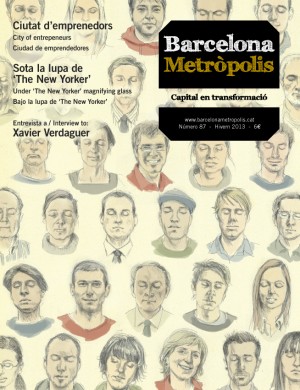After going strong for 26 years, Barcelona Activa has become an international benchmark in the field of the public promotion of entrepreneurship. It is currently a source of opportunities for many people who have either lost or are in danger of losing their jobs and turn to self-employment as an alternative.
Warren Buffett probably doesn’t have the foggiest idea what Barcelona Activa is, but nor would it be preposterous to think that in this case six degrees of separation is fulfilled: a chain of six people relating the US tycoon to one of the people in charge of the management of Barcelona City Council’s economic development agency. It is no coincidence that last year one of the billionaire’s holding groups, Lubrizol Corporation, bought Lipotec, a Catalan company with a prominent place in the history of this municipal agency, which helps up-and-coming entrepreneurs in their attempts to create start-ups.
At the Glòries Business Incubator, the first of the three business incubators that Barcelona Activa has deployed in the Catalan capital, hundreds of commemorative plaques hang from the ceiling, ordered by year, with the names of companies that started out at these facilities over its 25-plus years of history. The name of Lipotec takes pride of place.
Antoni Parente, one of the founders of this biotech company, has never forgotten those days. Between 1988 and 1992 he and his partners occupied one of the modules in this facility, and beyond finding a “a base from where we could present the project to administrations and foreign companies that were interested in it”, Parente recalls how Barcelona Activa was useful in the development of his former company: “The experience was positive, because it helped us to think about what we wanted to do when we drafted our business plan, even though we were already 38 years old and knew what we were doing.”
Lipotec and Barcelona Activa grew together and Parente is still involved with the agency, now as a speaker at some coaching sessions with groups of young people who want to become entrepreneurs. “Over time, things have become much more professional,” he says, highlighting the courses that have been delivered over the years. Nowadays, the range is very comprehensive: from business formalities and management to sessions on business cooperation, funding, marketing and internationalisation. These more general topics are complemented by other sector-specific ones, such as new technologies, the creative industries and the bio sector.
“Barcelona Activa aims to offer a range of business and employment services to increase the city’s wealth and employment,” states Susana Tintoré, the executive director of Barcelona Activa’s Business and Employment Services. In her view, this public body is much more than a business incubator. Over time it has gradually developed its activities and is now even one of the main commercial agents of the City Council, selling Barcelona as a business brand all over the world to secure talent and international investments. It is even leveraging the gold mine of the Mobile World Capital of Barcelona to “create a free trade area for entrepreneurs in the mobile sector”, as the executive director of the organisation points out.
After 26 years going strong, the organisation has become a benchmark. It was the first organisation of its kind in Spain and it has become a model for others, such as Madrid Emprende, created seven years ago, while other autonomous communities are now following suit. It has crossed borders to become an example in Monterrey (Mexico) and Cape Town (South Africa). Every year it is visited by some 200 delegations interested in learning about how it works.
However, above all, Barcelona Activa is an entrepreneurial springboard that has had to change with the times and economic cycles. The organisation was created at a time of economic hardship; it enjoyed the longest period of growth in the history of Catalonia and is now trying to help in the worst crisis that has hit western society in almost a century. All these components are noticeable, as are the cutbacks in the public resources that drive it. It is currently a source of opportunities for many people who have either lost or are in danger of losing their jobs and turn to self-employment as a way forward: entrepreneurship brought on by the recession. Half the people who use its services do so because they want to start up their own company after losing their own jobs. However, this is not an exception, at least in Catalonia. Entrepreneurship, formerly linked to the creation of an outstandingly new business segment, has enjoyed a fresh resurgence in Catalonia since 2011 due to the appearance of the unemployed as catalysts. In the case of Barcelona Activa this would also explain why, since the beginning of the crisis in 2007, the number of users has doubled and the number of start-ups has almost tripled (from 713 to 1,700).
Every month, more than 1,000 people attend its information sessions, and about 2,500 of them complete their business plan at the end of the year. Many projects fall by the wayside. “Some engineers come in with an idea, which might be good, but which perhaps they have not considered from the market standpoint,” Tintoré explains. Last year, Barcelona Activa helped to create 1,700 new companies, a remarkable figure if we consider that the figures from the National Statistics Institute of Spain talk of 6,416 start-ups in Barcelona in the course of the year, which would have generated some 3,200 new jobs.
An above-average success rate
The initial advice offered and the training and mentoring of future entrepreneurs looking to finance and incorporate their company help the companies eventually created to enjoy an above-average success rate. According to the institution, 84% of the companies that have benefited from its collaboration make it past three years, which goes a long way towards making them strong enough to survive.
The reason for this success rate is feedback. The experience accumulated over the years has earned the organisation the recognition of institutions and users alike. The high demand for services keeps the structure well oiled and up to date. “This all gives us a great deal of knowledge, but in our case the service is for everyone,” says Tintoré, demonstrating the differences between public organisations and private initiative.
Barcelona Activa currently runs three facilities called incubators: modules with shared services that companies can rent for a maximum of three years at a lower cost than the going market rate if net shared surface area is taken into account. This shared workplace model has evolved in recent years and has attracted the interest of private initiative, which has realised that the possibility of compartmentalising spaces and offering them at an affordable cost is highly appreciated by the new crop of professionals who have embraced the market in the throes of the economic crisis. They realise that it is possible to start up a business while containing costs and sharing experiences with other entrepreneurs from the same or different sectors.
In the case of Barcelona Activa, renting a space is complemented by a wide range of training courses and advisors on hand to answer any doubts, located a stone’s throw from the company’s headquarters. Some 140 companies currently occupy this surface area. Nevertheless, there could be more if the area were larger. There is a waiting list, and the organisation states that it does its utmost to limit entry so as not to create false expectations among future entrepreneurs.
In recent years the organisation has rolled out a structure that allows it to create limited companies (“SL” in Catalan) at a low cost, making it the place in Spain where most of these kinds of concerns are created.
Business recycling programme
The latest idea is to promote a market for buying and selling small companies. For years, investment banks and specialised companies have taken charge of looking for buyers of medium-sized and large companies put up for sale at some point, but these types of intermediaries did not exist for the smaller businesses, hence there was not even a market for them. To this end, Barcelona Activa is trying to make the Reempresa programme, initiated by the Cecot employers’ association, its own. It basically consists of a list of small businesses that are up for sale or about to be wound up even though they are profitable. In many cases they are people about to retire who have not found anyone who wants to continue their work, whereas in other cases they are simply people who want to take a new path in life. Hitherto, the problem was that nobody had addressed the possibility of finding new entrepreneurs.

© Christian Maury
Barcelona Activa contact and networking forums. The Cibernàrium MediaTIC building in the 22@ tech district.
“We are proposing the creation of a new system: recycling companies that already work by finding a re-entrepreneur,” says Albert Colomer, the programme’s director, who asserts that such initiatives work in other European countries but had never been tried in Spain. Colomer highlights the fact that 120,000 entrepreneurs are expected to retire in the next decade, and that these statistics reveal hundreds of opportunities. After finding 650 entrepreneurs willing to transfer their company and 600 to start their own business over the past three years, Reempresa has managed to close 60 agreements. The average cost of each operation, about EUR 25,000, gives us an idea of the type of company being offered. And Colomer is sure that the participation of Barcelona Activa in the project, which will open up information points at its facilities, will push Reempresa forward. “We are now at the crux.”
It is a matter of knowing which of the 10,000 potential entrepreneurs who visit the municipal agency’s centres every year will have to start from scratch or could manage a company that is already in operation. According to Colomer’s data, culled from similar cases in other European countries, one in five users of Barcelona Activa could be used by Reempresa. “We have to locate them and find out if they can continue the work started by other people years before,” says the manager of Reempresa.





